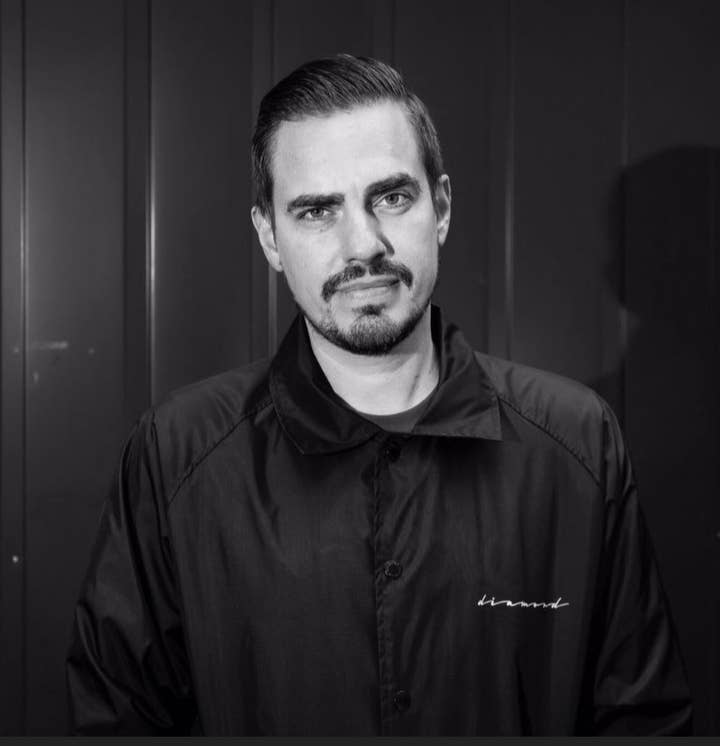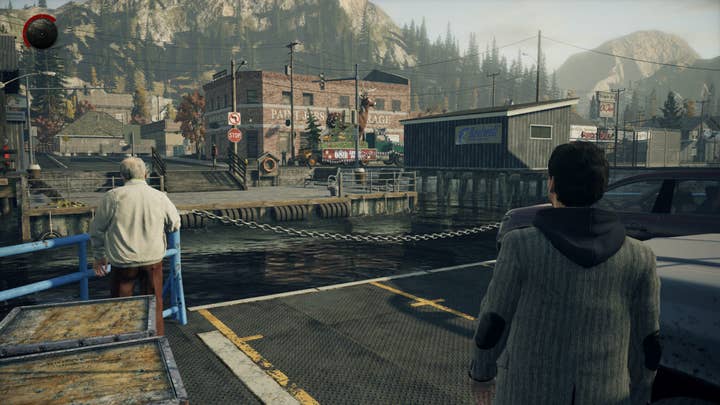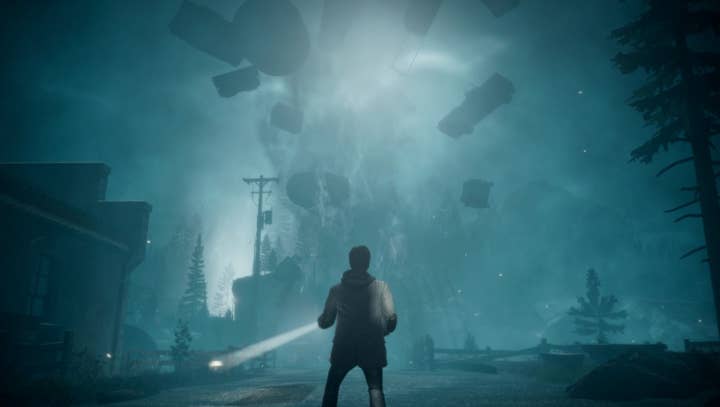Why bother bringing back Alan Wake?
Remedy discusses its new partnership with Epic Games to resurrect its 2010 cult classic
When Alan Wake arrived on Xbox 360 in May 2010, it found itself facing some huge competition.
It was an unusually busy May for video games that was headlined by Rockstar's Red Dead Redemption, which went on to become a global smash hit. As a result, and despite strong reviews, Alan Wake struggled to find the audience it needed.
11 years later, developer Remedy -- having obtained the IP rights from Microsoft -- is about to release a remaster of Alan Wake for modern consoles. And despite this being one of the quietest years for video games in a long time, Alan Wake is once again coming out during an unusually busy couple of weeks, with the likes of FIFA, Far Cry, Back4Blood and Metroid all fighting for chart supremacy.

"I wonder if it's just our kind-of karma where we like to pick dates where other big titles are launching," laughs Remedy's Chief Commercial Officer Johannes Paloheimo. "We are staying true to the tradition here with the remaster."
Of course, the games market is different today. Whereas in 2010, those first few weeks are crucial to a game's commercial success, that's not the case today, particularly following the rise of digital and the decline of pre-owned.
And Alan Wake is no-longer a new IP loaded with a huge amount of expectation. Back in 2010, this was Remedy's first game in seven years following its acclaimed Max Payne titles, and it was an exclusive for the market-leading Xbox 360.
"I remember when the game came out, I was still doing journalism," begins Thomas Puha, communications director at Remedy. "And the biggest newspaper in Finland called me to ask: 'This game hasn't sold a million, has it bombed?' The first few weeks are super critical, but it wasn't useful to compare Alan Wake to something like Max Payne. There was almost eight years in-between the games and things changed tremendously.
"Alan Wake took a very long time to come out. People waited for it every year, including myself. Then it's not out this year or this year or this year, and at some point you just lose momentum.
"When I joined Remedy, one of the first things I asked was: so what did you do for seven years? It was a fascinating discussion, because there were people who worked on it every day. And we've definitely learned a lot from that."
"The biggest newspaper in Finland called me to ask: 'This game hasn't sold a million, has it bombed?'"
Thomas Puha, Remedy
Paloheimo adds: "I was an outsider at the time, but I see it being a little like second album syndrome. Coming out of Max Payne, Remedy had all the time and financial resources to create the next big thing. And that's a tough position to be in.
"The ambitions were super high for Alan Wake. But they had to go back and do big changes. They moved from an open world to a more linear experience. And there was a lot of searching internally about... what can be done? And how can they do it?"
For all the talk around what went wrong with Alan Wake, it's worth remembering that the franchise not only survived its challenging beginnings, but it became a cult classic. There are fan sites dedicated to it, and Remedy even managed to return to the series via the DLC for its latest hit game, Control.
It may not have sold in huge numbers, but for those who did discover the game, Alan Wake has lived long in the memory.
"It has something to do with how we build games," suggests Paloheimo "The stories, the mysteries, the world... there is a lot of things left untold. The way that Sam [Lake, Creative Director] and our other creators approach these experiences, it just leaves a lot of mystery on the table that people just crave to know more about. It goes very deep into your soul."

Alan Wake was certainly unique for its time, a big-budget horror mystery that drew comparisons to David Lynch's Twin Peaks, which also staged a comeback thanks to its enduring fandom.
What has been crucial to Alan Wake's return, however, was Remedy taking control of the IP from Microsoft. In 2012, the developer was able to self-publish the game on Steam, and this immediately brought in a new audience and allowed the firm to have a direct relationship with its fans.
It also allowed Remedy to try things that a big company like Microsoft would struggle to see much value in doing.
"Having more freedom with your games allows you to do more of the grassroots work and slowly build the audience" Paloheimo explains. "That kind-of work takes a lot of time and effort, and the return might not seem significant enough to a big company.
"Steam was a big financial success for Alan Wake, but we also went with Nordic Game to do retail for [the PC version of] Alan Wake. And they were also doing 20 or 30 different digital stores that we did not manage. We saw all of those small streams come together to become a river, and it kept growing from there. It took a lot of time and effort, and to Microsoft that would have been too much work for too little return."
"A lot of praise goes to Microsoft for giving us the opportunity to expand Alan Wake outside of the Xbox ecosystem"
Johannes Paloheimo, Remedy
Puha adds: "There wouldn't be an Alan Wake without Microsoft. It is completely understandable for bigger companies to move on to the next thing. That's a very different view from our end, where it really is ours and we are ok that the revenue streams are small."
Paloheimo again: "We are super grateful and a lot of praise goes to Microsoft for allowing us to do this, and giving us the opportunity to expand Alan Wake outside of the Xbox ecosystem."
Alan Wake Remastered was announced in an unusual way. The game was revealed -- just five weeks before release -- via The Sudden Stop fan website, something suggested by PR agency Edelman and Remedy felt was the perfect idea.
And then days later, the game got an even deeper reveal as part of Sony's PlayStation showcase.
"The stars aligned that we could do this very community-friendly approach to announcing it, and then a couple of days later following it up with this huge beat with Sony," Paloheimo says.
"It was a very risky bet. You never know how these things will play out. We are a company that tries to do big things, but we are still small and nimble and can do things that the big publishers might find too risky. Sony might have said 'no, you can't announce it before us'. But they were very supportive."
The timing also works for Alan Wake's return, Puha says. Although the series struggled for sales overall, its spiritual successor -- 2019's Control -- has gone on to reach 10 million players. It is this game that has allowed the developer to create the 'Remedy Connected Universe' and bring back Alan Wake.

Remedy hopes Control fans will use this opportunity to give Alan Wake a try. And there's also another audience that Remedy hopes to attract with this remaster.
"The PlayStation audience hasn't experienced Alan Wake, and PlayStation fans have a tendency to like narrative-focused games, which is what we do," Puha reasons.
"That's not to say that there isn't plenty of fans on the Xbox side who haven't experienced Alan Wake, who also like single-player games. I've been playing [Microsoft-published] Psychonauts 2 over the last couple of weeks, and it's brilliant that something like that gets published.
"In the last couple of years, single-players games have... I wouldn't say they've come back, because they've never been gone. But that discussion around single-player games dying... I think we can now forget that. People love single-player games. And Alan Wake is a pretty unique narrative experience, for sure."
Remedy has ownership of Alan Wake, but the company isn't self-publishing this one. In fact, it is one of the first games to come out of Epic Games' new publishing division.
"It was in 2019 when we got the final piece of the publishing rights back, and that was when we felt we could pursue this remaster," Paloheimo says. "We knew Hector [Sanchez, head of Epic Games Publishing], before he joined Epic. We had a relationship there, and we got a heads-up on the publishing initiative. We contacted him and said 'how about we do something together with Alan Wake?'
"That discussion around single-player games dying... I think we can now forget that"
Thomas Puha, Remedy
"How they view creative studios and talent, and their different approach to publishing, really resonated with us. It was something that we wanted to support and be part of."
Puha says: "At that stage Epic Games Publishing was mostly just Hector. So we were very aware that we were jumping in while they were still building that operation. But the initial meeting went so well. Instead of the deal taking six months, I think the high-level details were thrashed out in weeks."
Back to Paloheimo: "It felt really good from the get-go. The long-term forms that tend to be the hard part of a publishing negotiation, that was done and brushed off in no time.
"Alan Wake Remastered is a good product to start a publishing relationship with. It's not like we're creating a new IP or something risky and unknown."
If the speculation is to be believed (and neither Puha or Paloheimo would confirm or deny anything), this isn't the last we'll hear from Alan Wake. And the studio has signed a two-game deal with Epic, which Remedy confirmed to us earlier this year are set in the same universe.
But the question I am left with is why? Remedy continues to make games for Microsoft (it's developed the single-player for the upcoming CrossfireX). And in Control it has a breakout hit (the studio has already confirmed it's doing a sequel). Cult fanbase aside, there appears to be no reason to dust off an 11-year-old game that struggled to find an audience to begin with. So why bother?
"A lot of people live and breathe Alan Wake here," Puha answers. "We've always said that it is a franchise that is near and dear to our hearts. The idea of a remaster has circulated for a number of years. The game has never been on a PlayStation platform, so there is a huge audience that we are missing.
"And, you know, things just age. And even though it was state-of-the-art on Xbox 360 back in the day, and it still looks pretty good, it is a 2010 game. Revamping and upgrading it made sense.
"But really, of course, this is a passion for us. We love Alan Wake."

